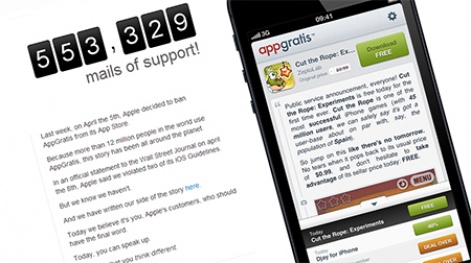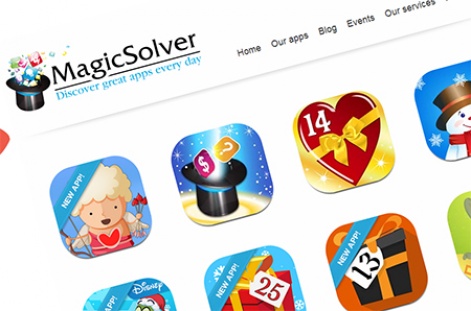Apple’s ban hammer appears to have swung again.
Reports have been flooding into us suggest that Apple has started to ban apps that utilise incentivised video and social sharing advertising to trade boosted ad metrics for in game currency.
Or has it? As with a number of times that Apple have changed the rules regarding app promotion and advertising on their network, confusion reigns due to the lack of communication from the Cupertino based gatekeepers.
Is this the beginning of the end for that particular eco-system? Is Apple out of its maniacal minds? Or is it simply pruning its garden fairly, cutting pernicious thorns from the App Store garden?
The truth is that, at the moment at least, we can’t be entirely sure of Apple's intentions, but from my own experience when I took my seat on the sinking Titanic that was known as the app discovery business, I believe that the writing is almost certainly on the wall for these methods of advertising.
Front row seat
In my previous role as head of editorial content at MagicSolver, an app discovery company, which shed its entire staff earlier this year, I watched first hand as Apple’s 2.25 edict, which bans apps from mimicking the App Store, slowly rotted away the company’s business model.
Clause 2.25 marked the beginning of the end for the app discovery industry as a whole.
In the first few quarters of 2012, the company was thriving. Offering apps that recommended apps within them with catchy editorial and a smart price drop mechanism, MagicSolver managed to gain enough traffic within its app catalogue to burst other apps to the top.
By providing clients with unincentivised CPI traffic to their app, which was maintained through cross promotion, user acquisition and a content team smacking sales executives suggesting yet another RPG over the head, a small Cambridge start up was able to turnover millions while keeping staff numbers under the size of a World Cup squad.
By October 2012, however, Apple hadintroduced the aforementioned clause 2.25 clause to instigate what later became the decay of the discovery business. It was, to be honest, slow at first. While AppShopper was immediately shot down by it, we managed to release one of our most successful apps at the end of that year. And by the beginning of 2013, despite the rule being introduced, our rival AppGratis secured $13m of investment to expand its products.
The real hammer blow fell in April 2013 when AppGratis was unceremoniously dumped from the store following its burst to the top of the free app charts. Simon Dawlat, CEO of the company, posted a stunned blog post telling the tale of how in the course of a flight to Brazil his company had been suddenly undermined by Apple with little more than a few missed calls and an email.

It marked the beginning of the end for the industry as a whole but, again, it wouldn’t arrive overnight or quite as dramatically as one would have thought.
While MagicSolver was soon banned from updating apps with an app discovery focus or from releasing new titles, the firm's existing apps retained their functionality and place on the store. We were quietly able to keep our business going for a while longer, underneath Apple’s sceptre, desperately avoiding a fatal blow by attempting to add mini games and social features to stave off the inevitable.
Unfortunately, that end came shortly after another moment of triumph. In December 2013, Apple withdrew our updated Advent calendar app, which recommended seasonal games to users in the manner of a daily chocolate calendar and was snuck through the approval process.
Cutting our major revenue stream and making it clear that there was little way to move forward within the coming months, company wide redundancies occurred in March 2014 and, nearly 18 months after the clause was enacted, pushed us out of the App Store.
Honest reflections
For much of the time I was at the company and for months after I left in February, just before the walls caved in, I blamed Apple.
During the time it happened, it was entirelty unhelpful and uncommunicative. Overnight, we went from legitimate to illegitimate and it cared little for the efforts we made to appease its wills. Phone conversations and email exchanges suggested features that we may have been able to implement changes to sneak back onto the store, but once they were in – still banned.
In my mind at the time, Apple closed us down and other editorially driven recommendation services to reinforce the App Store rather than for legitimate business reasons. As app discovery has died out, Apple has introduced collections, themed sets of apps and even an indie section to curate app recommendation in house with the help of, what I felt, was bully boy tactics.
Apple was well within its rights to do so and to cut MagicSolver out.
Yet on reflection, I feel that Apple was well within its rights to do so and to cut us out. On the one hand, the App Store is very much Apple's party and they’re able to cry if they want to. It offers developers a global platform to distribute their ads, analytics, promotional services and more so they are well within their rights to govern what is a rather magnificent platform in the way they see fit.
On the other, they had two very good and sensible commercial reasons to remove us. The first was that we were offering people the chance to get to the top of the charts and that option really only was available to those with deep enough pockets to buy tens of thousands of installs. While we weren’t seeking to hand out any old app to our users and we did offer genuinely interested customers, we definitely were contributing to the free chart problem Apple is still in the process of correcting.

But on a second count, our commitment to editorial integrity was always compromised in a way that Apple’s selection never could be. While I always did my best to guarantee our selection of apps appealed to all of our user base on a day to day basis, commercial realities of the market and commitment to price drop deals meant that our hands were tied.
On a basic principle, we didn’t fully serve our consumers’ expectations in the way Apple’s editorial picks did and, as a result, we deserved some of what was coming to us.
Lessons for all
What though is to be learned from this sorry tale in the context of these latest developments? While the above may read more as a cathartic soul release, there are a number of relevant lessons from that experience that I would say developers and advertisers should be considering right now.
The main lesson is that the App Store is Apple’s and it will do with it what it sees fit to give itself a commercial advantage. It is oft described as a walled garden but I see it more through the lens of Hilary Mantel’s Tudor court: an area where you can survive and thrive by being close to power but where you can easily swing out of favour at any point.
App discovery was one area affected by this approach, but others have been too. Music apps competing with the forthcoming iTunes radio have been hit, with Bloom’s streaming service shutting down barely weeks after Apple denied them the right to use the iAd network and music download apps not directing traffic through iTunes being rejected from this week.
The App Store is Apple’s and it will do with it what it sees fit to give itself a commercial advantage.
Therefore, the outlook for incentivised ad services of this ilk on iOS is poor. While there won’t be an overnight purge, quiet rejections and blocking of updates will likely become the norm over the next year – eventually leading to a slow suffocation of the market in the App Store ecosystem.
Of course, that doesn’t necessarily include Apple. The announcements of video clips in iOS 8, the introduction of IAP promo codes and the general extension of the iAD user acquisition offering suggest that a clever technical chef could easily create an in house incent network of their own. Mischievous to suggest perhaps, but it wouldn’t be out of the realms of possibility that Apple is looking at implementing its own way of solving the problem.
So my advice for companies affected is simple: look out for that writing on the wall and, if you spot it coming, prepare to change course.
The biggest mistake of all at my old company wasn’t doing something that Apple didn’t like or any of the other catalogue of mistakes I could list – it was behaving as if we could live as before working in the shadow of the deadly scythe. That damned us more than anything else and was the root of our problems.
Therefore, I recommend quite simply that you watch and adapt to whatever happens in the next few months. Apple are unlikely to ever officially announce this policy change but you’ll see for yourself whether it is happening or not through whether your game is rejected or not if it sports those features. It’s an imprecise art, of course, but with Apple’s subtle approach to enforcing its will you’ll likely find out that answer with the ever so polite email it sends you to inform you your game isn’t going on the store.
What I guess I’m saying is don’t be a pessimist about it – be a pragmatist. The signs are that Apple has decided this element of the industry is either there’s for the taking or something they don’t like.
So if it looks like the wind is blowing that way, change your course – Apple is far from a tyrant, but when it comes up to going against it, as I discovered to my cost, chances are you’re going to end up on the chopping block.






















